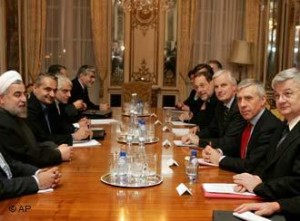 Zbigniew Brzezinski,�Iran should be key topic at hearings:�The former�National Security Advisor�to�President�Jimmy Carter urges the�Senate Foreign Relations Committee to include a discussion about the implications of a �self-generated� war with Iran during its upcoming hearing. Key paragraph:
Zbigniew Brzezinski,�Iran should be key topic at hearings:�The former�National Security Advisor�to�President�Jimmy Carter urges the�Senate Foreign Relations Committee to include a discussion about the implications of a �self-generated� war with Iran during its upcoming hearing. Key paragraph:It follows that a failure to reach a satisfactory negotiated solution with Iran should not be viewed as the trigger for a new U.S.-initiated war that is not likely to be confined just to Iran. A more prudent and productive course for the United States would be to continue the painful sanctions against Iran while formally adopting for the Middle East the same policy that for decades successfully protected America�s European and Asian allies against the much more dangerous threats emanating from Stalinist Russia and lately from nuclear-armed North Korea. An Iranian military threat aimed at Israel or any other U.S. friend in the Middle East would be treated as if directed at the United States itself and would precipitate a commensurate U.S. response.
Seyed Hossein Mousavian and Mohammad Ali Shabani,�How to Talk to Iran:�The Iranian perspective provided by a former lead Iranian�negotiator (now at Princeton) and a SOAS doctorale candidate. Any deal with Iran needs to offer Iran a face-saving way out, they argue:
While Tehran views a deal on its nuclear program as being in its self-interest, Western leaders need to grasp that it would be devastating for Iran�s aberu to take the first step solely in exchange for promises. The dominant discourse in Tehran portrays the 2004 decision by the former Iranian president Mohammad Khatami to suspend uranium enrichment on a voluntary, temporary basis as a failure because it resulted only in humiliating calls by the West for an indefinite suspension. The moral of this narrative is that placing maslahat above aberu, even temporarily, leads to nothing good.
Trita Parsi,�Is A Deal With Iran In The Offing?:�The Iran expert, whose book,�A Single Roll of the Dice � Obama�s Diplomacy with Iran�topped Foreign Affairs��Best Books of 2012�on the Middle East list, describes the motivation behind the US-led Iran sanctions regime in his analysis of whether a deal is possible this year:
�the deal must not just prevent a nuclear weapon in Iran, it must also put Iran �back into its place� within the regional pecking order. While acceptance of limited enrichment in Iran opens the way for a nuclear deal, strangulating sanctions are deemed necessary to remind Tehran and other regional powers who is the de facto hegemon in the region�and who isn�t.
Reza Marashi,�Step by Step with Iran:�The former Iran desk state department staffer and analyst argues that a�step-by-step process based on reciprocity provides a framework for the least bad option for both sides of the Iranian nuclear spectrum:
Tehran would stop enriching to the 20 percent level; ship out its stockpile of corresponding uranium to a mutually agreed-upon third-party country; shut down its Fordow facility; and reduce its existing stockpile of low-enriched uranium below the level needed for any possibility of weaponization. In turn, Washington would suspend key banking sanctions, back a suspension of the EU oil embargo, and freeze new sanctions initiatives. Under this arrangement, both sides are trading an equal number of concessions, which in turn builds trust, buys time for negotiations to continue, and helps disarm spoilers in Washington, Tehran, Tel Aviv, Brussels and Riyadh.
Joe Klein,�Obama�s Next Foreign Policy Battle:�The TIME political columnist sums up how the�battle over Chuck Hagel�s nomination�as Secretary of Defense factors in to the tug-of-war between Israel lobby groups in the US and the President and his allies:
And then there�s Iran. A nuclear deal may be negotiated this year. The Iranians are suffering economically; there are indications that they are ready to talk. But any such deal will be vehemently opposed by Netanyahu and the neoconservatives. The Hagel nomination, if it comes, will be the warm-up act for those battles. It is a fight that would send an important message about the President�s intentions�to Iran, to Israel and to the out-of-touch leaders of the American Jewish community.
Eskandar Sadeghi-Boroujerdi,�Former Supreme National Security Chief: Crass talk is not foreign policy: The title says it all. A key quote from a�former Chief of Iran�s Supreme National Security Council:
�It is not clear whether the actions that have been undertaken in these last couple of years were engagement or confrontation. If we want to have a role in global decision making, we must in reality choose engagement�Let�s define �offensive�; �offensive� means an action we undertake which doesn�t allow the enemy to implement his plan against us or a conspiracy he wants to commit against us, and we move one step�.
David Axe,�Iran Unveils Copycat Arsenal:�The Danger Room�s military correspondent provides a rundown of Iran�s makeshift though still potentially dangerous weapons arsenal:
But that doesn�t mean all of Tehran�s weapons suck. Far from it. While some of the sillier Iranian gear is obviously meant mostly for�fleeting propaganda purposes, the main hardware is grounded in experience and hardship. Driven by desperation and shaped by the isolation that comes with widening external sanctions, Tehran�s copycat arsenal could contain a few nasty surprises for the U.S. and its allies in the unlikely event that tensions over Iran�s nuclear program come to blows.
By Lobelog
The Iran Project is not responsible for the content of quoted articles.










